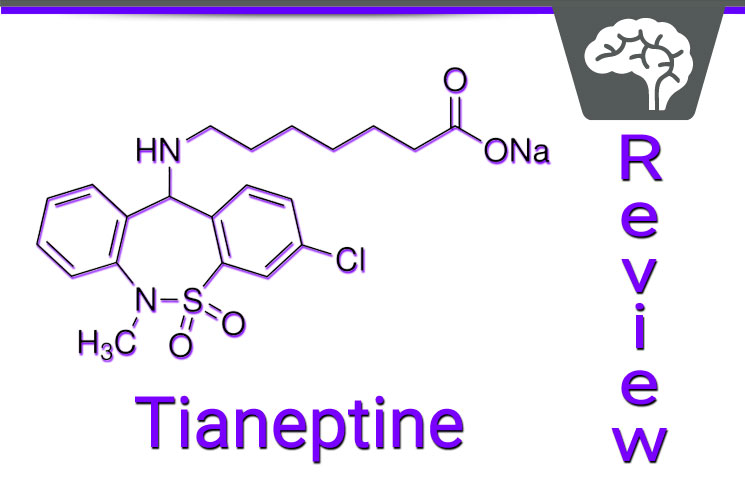Tianeptine Review
Tianeptine is the chemical name for popular anti-depressive medications like Stablon, Coaxil, Tatinol, Tianeurax, and Salymbra. Here’s our review of how Tianeptine and what it does.
What is Tianeptine?
Tianeptine is an anti-depressant and anti-anxiety medication. Unlike many other types of anti-anxiety medication, Tianeptine lacks sedative side effects. It also has not been linked to any cardiovascular problems.
Tianeptine has been around since the 1960s and is particularly popular in Europe (the drug was patented and first approved in France). Coaxil is commonly prescribed throughout Europe and some parts of Asia for its anxiolytic (anti-anxiety) and anti-depressive effects.
However, Tianeptine is not available in Australia, Canada, New Zealand, the UK, or the United States.
How Does Tianeptine Work?
Tianeptine acts as a neuroprotective antidepressant. It works by reversing the neuronal damage and lasting misery caused by chronic, uncontrolled stress.
The drug works differently from other anti-depressants and anti-anxiety medications because it acts as a selective serotonin reuptake enhancer. Most anti-depressants and anti-anxiety medications work as selective serotonin reuptake inhibitors, which mean they raise serotonin levels within the brain.
As Tianeptine.com explains:
“[Tianeptine’s] puzzling efficacy as an antidepressant illustrates how little modern psychiatric medicine really understands about mind, mood and depression.”
Warning: unless you’ve studied the brain, you probably won’t understand the next few sentences. In July 2014, researchers examined Tianeptine and mad some surprising discoveries about how it worked:
“A breakthrough in tianeptine research was announced in July 2014 with the unexpected discovery that tianeptine is a full agonist at the mu and delta opioid receptors with negligible effect at the kappa opioid receptors. Selective mu opioid agonists in the brain's “hedonic hotspots” typically induce euphoria. Selective kappa agonists typically induce dysphoria. The role of central delta opioid receptors is poorly understood. Dual activation of the mu and, less potently, delta opioid receptors may be critical to tianeptine's mood-brightening and anxiolytic effect.”
Basically, Tianeptine acts on receptors that are poorly understood by researchers – but nevertheless appear to be linked to major anti-depressive benefits.
How to Buy Tianeptine
Tianeptine is available widely throughout the world, including many parts of Europe and Asia.
Notably, the drug is not available in many other western countries, including Canada, the United States, Australia, New Zealand, and the United Kingdom.
When buying the drug in other parts of the world, here are the brand names used:
— Tatinol (China)
— Tianeurax (Germany)
— Zinosal (Spain)
— Coaxil (Czech Republic, Hungary, Poland, Russia, Ukraine).
— Stablon (Argentina, Austria, Brazil, France, India, Indonesia, Malaysia, Mexico, Portugal, Singapore, Thailand, Turkey, and Venezuela).
Online, the powder typically retails in 1 gram tubs for $10 to $15.
How to Use Tianeptime
The typical dosage for Tianeptine is 12.5mg. Typically, you buy the substance in tubs of around 1 gram (which costs between $10 and $15).
At this dosage, users should feel the relaxation effects of Tianeptine as well as its focus-enhancing benefits. By calming the mind, many people find they feel more focused at school or work.
The primary benefits of Tianeptine, however, are a reduction in anxiety and an improvement in mood. This is why the powder is particularly popular with those who suffer from anxiety and mood disorders.
Tianeptine and Its Nootropic Benefits
On the internet, you’ll find plenty of stories of people taking Tianeptine for its nootropic effects on the brain. These people are taking Tianeptine because of one study published in 2014 that demonstrated that Tianeptine could improve cognition.
That study was published in the September 2014 issue of Psychiatry Research. As part of that study, researchers examined a total of 35 studies involving various pharmaceuticals used to treat cognitive impairment and dysfunction.
Cognitive improvements were not a focus in most of these 35 studies. Nevertheless, researchers of the September 2014 study found that the few studies that did examine the cognitive effects of Tianeptine and similar medications found that the medications showed “promising results for the improvement of cognitive impairment in depression.”
Nevertheless, researchers cautioned that there were several methodological constraints in these studies.
Tianeptine Side Effects
One of the reasons Tianeptine is so popular is that it has limited side effects. Unlike other anxiolytics, for example, Tianeptine does not affect your cholinergic systems (responsible for producing the memory-boosting neurotransmitter acetylcholine) nor does it affect cardiovascular functionality. This is why the supplement is commonly prescribed to elderly people, recovering alcoholics, or others who may have weakened immune systems.
Nevertheless, like all medications, Tianeptine users may experience some side effects.
Common Side Effects:
— Dry mouth
— Insomnia
— Headaches
Unlike other anxiolytics, however, Tianeptine is not thought to cause sedation or digestive health problems.
Despite the fact that Tianeptine is not officially available in the United States, Canada, or other parts of the world, you can find certain online retailers selling the drug today. As mentioned above, you can expect to pay $10 to $15 for a one gram tub of Tianeptine (which lasts for about 80 doses).









